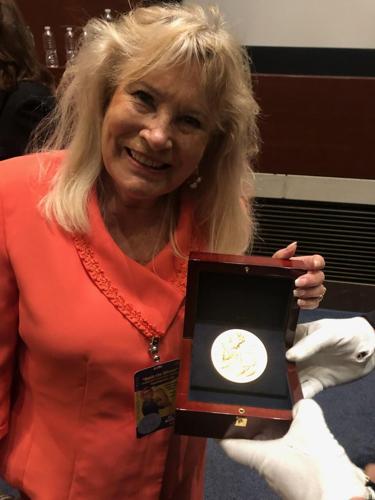Lifelong Norman resident Wanda Cook made a very special trip to the nation’s capital this week, where she accepted a Congressional Gold Medal on behalf of her late mother, Mildred Wilkerson Reedy, who served as a “Rosie the Riveter” during World War II.
The medal — which is the highest civilian award bestowed by the U.S. Congress — was awarded as a long-overdue recognition for the approximately 16 million American women who stepped up to fill critical wartime roles on the home front, working in factories, farms, shipyards, munitions plants and aviation facilities to support the armed forces. Thanks to the now-iconic war poster, they soon became known collectively as Rosies.

The Rosie the Riveter Congressional Gold Medal.
The presentation ceremony, held at the Capitol building on April 10, was arranged by U.S. Speaker of the House Mike Johnson’s office, working in collaboration with the Smithsonian Institute, where the medal will be permanently housed.
Twenty-two living Rosies were in attendance, along with more than 400 family members and dignitaries. Among them were Cook’s nephew, Zack Jones, who is one of Johnson’s speechwriters and staffers and played a key role in organizing the event honoring his great-aunt.
“My mother’s story is just one of millions, but it’s a testament to the sacrifices and contributions of that generation of women,” Cook said, adding that it was among the most thrilling experiences of her life.
She was one of only two attendees who were actually able to hold the medal, prior to its being moved to the Smithsonian.
“I’m still in a state of euphoria,” Cook said. “To step into the House Chamber, and to shake hands with the Rosies — living legends — was beyond special. Getting to actually hold the medal felt like winning Wimbledon for mom and all of her fellow patriots.”

Mildred Reedy
“Many of these women didn’t just go to work, they picked up and moved across the country to do these jobs,” Johnson noted during the ceremony. “We recognize these Rosies here today and millions more because they all sacrificed time away from home, and they used their God-given strengths and talents for the good of our nation and for military victory against the Axis powers.”
Cook’s mother, Mildred, was among those who moved across country, postponing college and leaving her father’s farm east of Norman to travel to Pasadena, California.
She spent two years there, working 12-hour days, six days a week in hazardous conditions, building radios for fighter jets, rocket cylinders, and ramps for mechanized landing craft. Her exceptional skills and sacrifice led to her inclusion in the Rosie-the-Riveter WWII Home Front Historical Park in Richmond, California.
After the war, Reedy continued to serve her country, including more than a decade as president of the Norman American Legion Post #88 Auxiliary and the State of Oklahoma American Legion Auxiliaries. She was involved with the former organization for an astounding 40 years, along with many other community service organizations and efforts.
“She and my father (a WWII Navy veteran) were tireless in their efforts to help veterans, and they often went to the state Capitol to advocate for vets,” Cook said. “The words are overused, but my mother was strong and resilient, and was truly part of the Greatest Generation.”
During the medal presentation, undoubtedly the most moving speaker was 97-year-old Mae Krier, one of the original Rosies, who worked with members of Congress for several years in a bipartisan effort to make the recognition a reality.
“I am proud to symbolically accept this award that represents millions of women,” Krier said, through tears. “Up until 1941 it was a man’s world. They didn’t know how capable us women were, did they? Our Rosies have left their footprints in the sand.
“One of the greatest things we’ve left behind is what we did for women. We’ve gone down in history. I love that. Remember our four little words — We can do it!”
Other event speakers also noted that American society changed forever once the Rosies entered the work force, proving they could do jobs that had previously been reserved for men. Many of the facilities where they worked, such as the Higgins Shipyard in New Orleans, also were among the first to employ and integrate women from different races and backgrounds.
“They forever changed the role of women in the workforce,” said U.S. Rep. Susan Collins, R-Maine, who co-sponsored the bill to establish the award. “At a time of great peril for freedom here at home and around the world, mothers, wives, sisters, daughters stepped forth to answer our country’s call to action by working tirelessly in support of our armed forces. The can-do spirit of Rosie the Riveters has inspired generations of women ever since. These women turned into heroes, and they transformed American society forever, by proving they could handle jobs traditionally seen as men-only.”
Cook said she is tremendously proud of her mother’s achievements and the long-overdue recognition of their impact.
“They paved the way for all future generations of women and other marginalized people to accomplish epic feats of unimagined proportions,” she said. “These Rosies, including my mother, demonstrated ‘true grit’ and lived life with sacrificial determination and spirit!”





















Commented
Sorry, there are no recent results for popular commented articles.